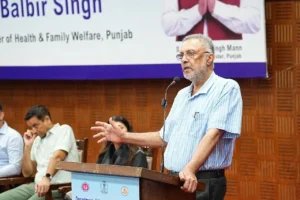CHANDIGARH, Sept. 24, 2025 — Punjab has become the first state in India to introduce artificial intelligence (AI)-powered devices for detecting breast cancer, cervical cancer and eye diseases, a move government officials called a historic advance for public healthcare.
The program was inaugurated Wednesday by Health and Family Welfare Minister Dr. Balbir Singh at the Chandigarh Municipal building. “Human beings are one of nature’s finest creations, and humanity has always fought battles within the body,” Dr. Singh said. “Cancer is a deadly disease, and keeping the public’s health in mind, the Punjab government has taken this important step. With AI, both cancer and eye screenings will now be possible.”

Dr. Singh said the state’s immediate target is to conduct 600 eye screenings and 300 breast and cervical cancer screenings each day. He noted that early detection is the most effective defense against life-threatening illnesses and added the effort will provide “a new layer of safety not just for women but for society as a whole.”
The initiative aligns with Chief Minister Bhagwant Singh Mann’s stated vision of strengthening healthcare through technology. Officials framed the rollout as part of a broader governance strategy that positions AI as both a medical tool and a means to improve transparency and efficiency across departments.
Earlier, the state undertook an AI- and videography-based survey of 3,369 roads. The survey found 843 roads were already in good condition despite earlier repair expenditures, and officials said the exercise avoided duplicate spending and saved ₹383 crore—funds the government plans to reallocate to welfare projects.
The technology push has also extended to corrections and law enforcement. A ₹252-crore overhaul is underway in jails, where 5G jammers, AI cameras and live monitoring systems are being installed. In transport services, Punjab has introduced AI-based HAMS technology in driving license tests; the system records each candidate’s performance, officials said, removing space for middlemen or manipulated results.
Education is another major front for AI adoption. The state is training 10,000 teachers to use and teach AI, officials said, so that lakhs of students receive early exposure to the technology. The government argued this will equip youth not only to find jobs but to become job creators.
Punjab Agricultural University has launched AI-based courses aimed at helping farming families adopt modern technology. At the same time, the government has begun a mission to integrate the Punjabi language with AI, seeking to raise the mother tongue’s digital profile and create local opportunities for youth.
Officials said the measures represent a broader shift in how development is defined. “Today, development doesn’t only mean roads and buildings,” Dr. Singh said. “It also means access to technology that can make every citizen’s life easier.”
For the Mann government, the emphasis has been on pairing transparency with modernization. From policing and prisons to healthcare and education, AI is central to its administrative model, officials said, and the approach is intended to ensure taxpayer money is used in the public interest.
“This is a Punjab that will be recognized not for scams, but for honesty, technology and progress,” officials noted, framing the initiative as both a technological leap and a political statement.


